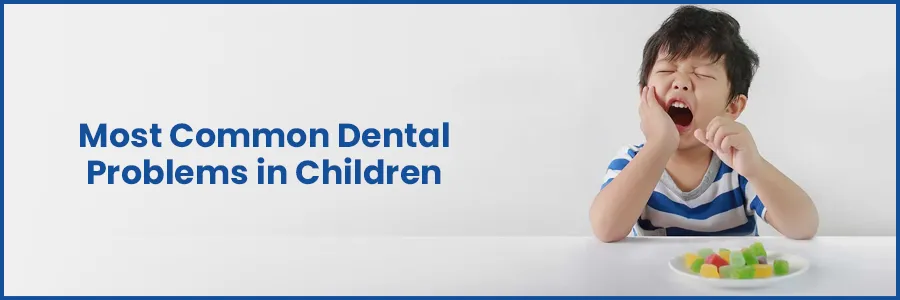- Cardiology 84
- Dermatology 45
- Endocrinology 33
- ENT 16
- Fertility 190
- Gastroenterology 78
- General-Medicine 81
- Gynecology 80
- Hematology 19
- Infectious-Diseases 33
- Neurology 52
- Oncology 34
- Ophthalmology 23
- Orthopedics 69
- Pediatrics 31
- Procedure 23
- Public-Health 144
- Pulmonology 59
- Radiology 8
- Urology 68
- Wellness 161
- Woman-and-child 77

Common Dental Problems in Children
As parents, our utmost priority is to guarantee the well-being and health of our children. One crucial aspect of overall health is dental hygiene.
Kids, with their developing teeth and oral habits, are prone to certain dental problems that require attention and care. Let’s dive into the common dental problems children often face.
Dental Problems and Causes in Children
Dental Caries (Cavities)
- Dental caries, commonly known as cavities, are one of the most prevalent dental problems in children.
- They occur when the enamel of the teeth gets damaged due to bacteria and acids, leading to the formation of small holes in the teeth.
- Factors like poor oral hygiene, sugary diets, and irregular dental check-ups contribute to the development of cavities in kids.
Misaligned Teeth
- Many children experience issues with misaligned or crooked teeth. This can be caused by a combination of genetic factors, prolonged thumb-sucking, or using pacifiers beyond infancy.
- Misaligned teeth can cause difficulties with chewing and speaking, and even lead to low self-esteem.
Gingivitis (Gum Inflammation)
- Gingivitis refers to the inflammation of the gums, often characterized by redness, swelling, and bleeding.
- Poor oral hygiene and irregular brushing and flossing can lead to gingivitis in children, which can progress to more serious gum diseases if left untreated.
Tooth Sensitivity
- Tooth sensitivity in children can be caused by thinning enamel, which exposes the nerves of the teeth to temperature changes, acidic foods, and sugary beverages.
- This can result in discomfort and pain when eating or drinking.
Solutions to Child Teeth Problems
Maintaining Proper Oral Hygiene
- Instilling good oral hygiene habits in children from an early age is crucial. Teach them to brush their teeth twice a day using fluoride toothpaste.
- Encourage regular flossing to prevent food particles from getting trapped between teeth.
Balanced Diet
- Limit sugary snacks and beverages, as they contribute to cavities.
- Encourage a diet that includes plenty of fruits, vegetables, whole grains, and lean proteins. Drinking water after meals can help wash away food particles and acids.
Regular Dental Check-ups
- Schedule regular visits to the dentist, starting from an early age. Dentists can identify potential issues and provide preventive care.
- Dental sealants, which act as protective barriers for teeth, can also be applied to prevent cavities.
Orthodontic Evaluation
- If misaligned teeth are a concern, consult an orthodontist for an evaluation.
- They can recommend appropriate treatments, such as braces or other orthodontic devices, if necessary.
Fluoride Treatment
Your dentist may recommend fluoride treatments to strengthen tooth enamel and decrease the chances of getting cavities.
Prevention and Treatment
Prevention:
- Brushing with fluoride toothpaste
- Flossing daily
- Reducing sugary foods and drinks
- Regular dental check-ups
Treatment: If cavities do develop, treatments include fillings, crowns, and, in severe cases, root canals. Early intervention is crucial to prevent the spread of decay.
Conclusion
Taking care of your child's dental health is an investment in their overall well-being. By promoting good oral hygiene habits, maintaining a balanced diet, and scheduling regular dental check-ups, you I can assist in promoting the development of a healthy smile for your child.
I can assist in promoting the development of a healthy smile for your child. lasts a lifetime. Remember, prevention is key, and early intervention can address dental problems before they become more serious issues.
Ready to take control of your health journey? Book your appointment now and start your path towards wellness today!
Book an AppointmentFrequently Asked Questions
It's recommended that a child's first dental visit occurs around their first birthday or when their first tooth erupts.
Prepare them by explaining what to expect. Choose a pediatric dentist experienced in working with children and maintaining a positive, calm attitude.
Yes, baby teeth play a vital role in speech development, chewing, and holding space for permanent teeth.
Prolonged thumb-sucking can lead to misaligned teeth. Most children naturally stop thumb-sucking by the age of 4, but if it persists, consult a dentist.
Fluoride is safe and beneficial for children's teeth when used in appropriate amounts. Consult your dentist for guidance on fluoride use.
Ensure your child brushes their teeth twice a day with fluoride toothpaste, flosses daily, eats a balanced diet, and avoids sugary snacks and drinks.
Teeth grinding, or bruxism, is common in children and often goes away on its own. If it persists or causes problems, consult your dentist for possible treatments.

- Cardiology 2132
- Dermatology 168
- Endocrinology 135
- ENT 97
- Fertility 217
- Gastroenterology 232
- General 478
- General-Medicine 1685
- Gynecology 169
- Hematology 85
- Infectious-Diseases 208
- Neurology 207
- Oncology 345
- Ophthalmology 65
- Orthopedics 187
- Pediatrics 83
- Procedure 72
- Public-Health 209
- Pulmonology 126
- Radiology 13
- Second Opinion 311
- Urology 294
- Wellness 600
- Woman-and-child 447
- Others 10217
Related Blogs
If you have any questions, please fill out the enquiry form or call us, and we will get back to you promptly.
040-68334455